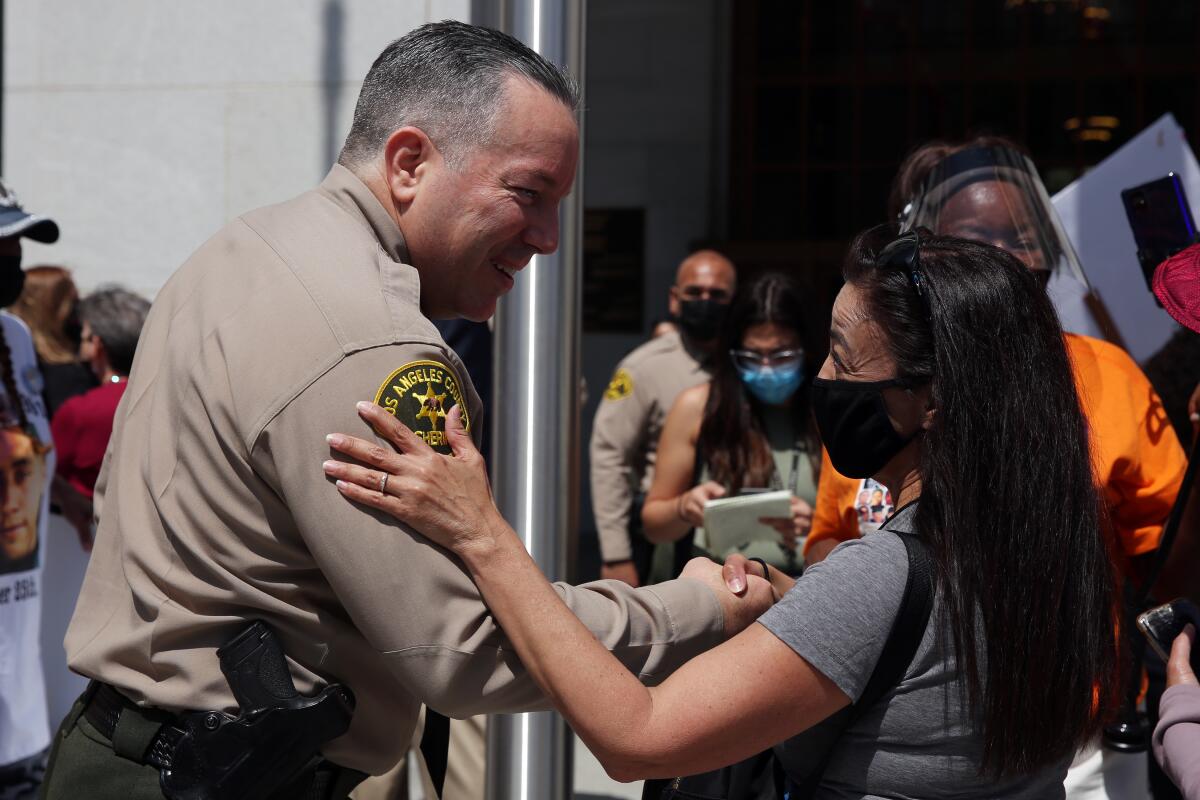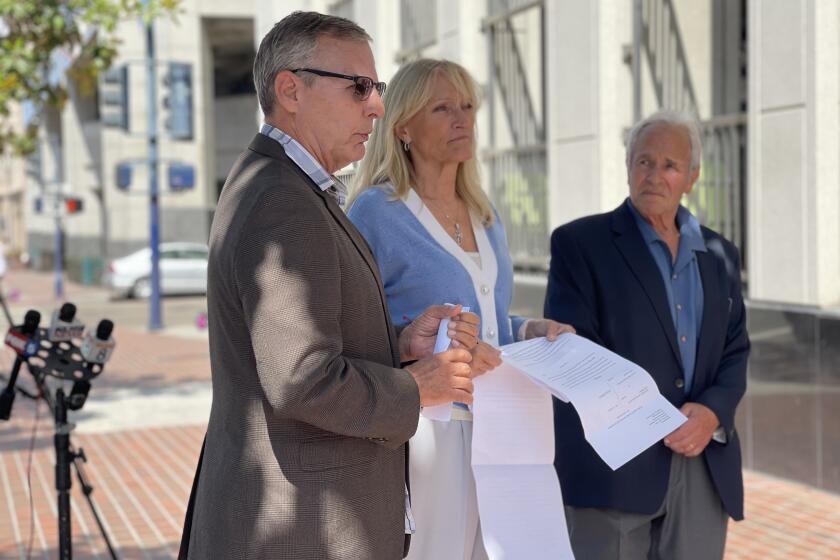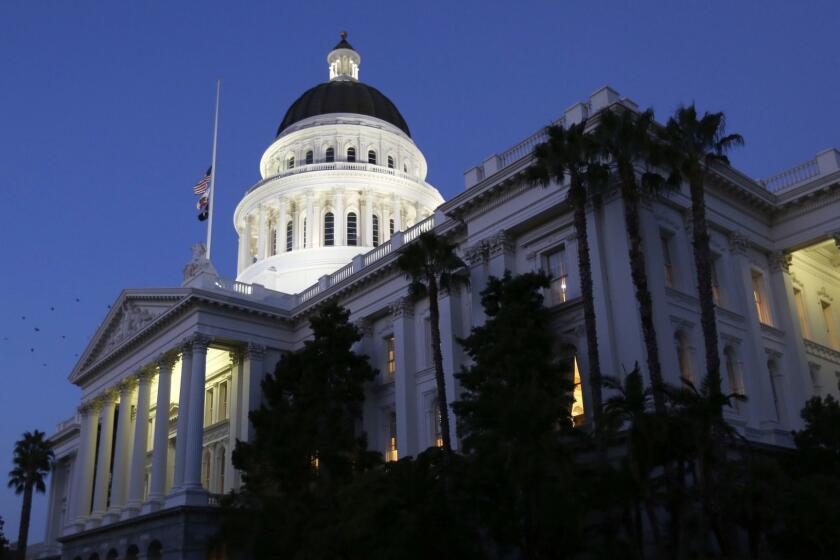Editorial: Victims of criminal violence need help, but so do those harmed by law enforcement

- Share via
An act of violence is often merely the tragic beginning of a long period of pain and trauma for survivors. Assault victims face immediate medical costs, and their injuries may leave them unable to work and therefore unable to earn money for rent or to care for their children or other dependents.
When the violence results in death, the family may face funeral costs that they cannot pay on top of the sudden loss of income from their loved one. In their time of deepest grief, families may have to resort to GoFundMe campaigns or carwashes to be able to bury their loved ones with dignity — an essential part of the healing process. Devastated children who lose a parent can suffer lingering emotional problems that require specialized care.
Failure to deal with one such injury and loss can result in a downward spiral of vulnerability and repeat victimization, not just of the direct victim, but also for extended families and entire communities. Violence victims, their trauma untreated, too often lash out at others, repeating the cycle and making recovery more difficult for all involved.
Traditional crime victims groups are emboldened by the possible recall of Gov. Gavin Newsom and some district attorneys. But other groups are redefining the term ‘victim.’
So it’s not only humane but in our collective best interests to offer relatively quick compensation to survivors of violence to help them heal. It’s for that reason that California has the Victim Compensation Board, which reviews applications for financial assistance and distributes money, generally within 90 days of the application. Applicants must show that they lack insurance or aren’t eligible for compensation from Medi-Cal coverage.
The fund is replenished by restitution fines ranging from $150 to $10,000, imposed on everyone convicted of a crime in California. In most cases, the fund pays the victim well before the perpetrator is convicted, or even if the perpetrator is acquitted, not tried or never identified. Payouts are capped at $70,000 but are generally much smaller. There are also caps on individual expense items, for example $1,000 for crime scene cleanup. And if a victim gets a damages award or insurance payout later, they have to repay the fund for the aid they received.
We generally think of injurious violence as being inflicted by criminals. But when the injury is caused by a family member, for example in a domestic dispute, the impact can be at least as bad, and the need for financial assistance can be just as great. The key here is not to assign criminal or civil liability, or to take sides in serious family disputes, but to heal the injuries and stop the chain of trauma insofar as money can do it. No crime need be charged for victims to receive compensation from the fund.
But what if the injury came at the hands of police? When a law enforcement officer inflicts serious bodily injury or death, the results to the survivors are the same as if the violence were inflicted by a criminal or a family member — unmet medical or burial expenses, loss of support, devastated family and community, a continuing chain of untreated and repeated trauma. The same Black and Latino communities that are most often victimized by criminal violence also bear the brunt of injurious police force. Payment from the California Victim Compensation Board is as needed and would be as helpful to those individuals, families and neighborhoods as compensation for crime or for family violence.
The state Senate has approved a bill to extend assistance to qualified survivors of police force. Senate Bill 299 faces one of its final hurdles Wednesday in the Assembly. It’s a worthy bill and should be adopted.
Some law enforcement groups take issue with the bill for reasons that are off base, even if understandable. They argue that the bill appears to equate police use of force, even when exercised appropriately, with violent crime. They call it a political statement made for the George Floyd era.
California provides money and other assistance to victims of violent crime, but the aid is available only to those who know to ask for it.
It’s not. The purpose is expedited compensation for injury at the hands of another. The board does not substitute as a police discipline panel or criminal prosecution, and in fact its decision to compensate cannot be introduced as evidence in any of those proceedings. The board does not assign fault. It identifies and compensates victims of violence.
Under the bill, the family of a person shot to death by police would be able to seek compensation from the fund for burial expenses, for example, or a home security system, relocation costs or other eligible needs, regardless of whether criminal and disciplinary investigations into the incident are ongoing. They would not be required to assist the police in their probe, or to submit the police report, because survivors of police violence understandably are reluctant to work with police in documenting what happened. Current law already allows the board to use non-police evidence (including medical records and witness statements) to determine that victims of sexual assault, human trafficking and domestic violence are eligible for compensation. The same flexibility should be granted when the applicant is a survivor of police violence.
Victim compensation is not a damages award or a finding of fault. It’s simply financial aid for families and communities suffering from the consequences of violence, and it is badly needed in California.
More to Read
A cure for the common opinion
Get thought-provoking perspectives with our weekly newsletter.
You may occasionally receive promotional content from the Los Angeles Times.












